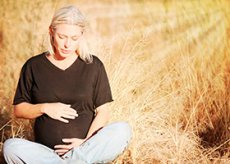New publications
Intestinal barrier function is altered in pregnant women
Last reviewed: 02.07.2025

All iLive content is medically reviewed or fact checked to ensure as much factual accuracy as possible.
We have strict sourcing guidelines and only link to reputable media sites, academic research institutions and, whenever possible, medically peer reviewed studies. Note that the numbers in parentheses ([1], [2], etc.) are clickable links to these studies.
If you feel that any of our content is inaccurate, out-of-date, or otherwise questionable, please select it and press Ctrl + Enter.

In a new experiment conducted on rodents, scientists were able to demonstrate that bacteria in the gut of expectant mothers provoke changes in intestinal barrier function.
A little earlier, specialists believed that metabolic disorders in the body of a pregnant woman were entirely related to the corresponding hormonal changes. Now they have managed to prove that changes in the intestines at the bacterial level also affect metabolic changes. This information allows us to reconsider the physiological features of the course of pregnancy, and, if necessary, make changes to the quality of the woman's microbiome.
The intestinal wall acts as a barrier that protects the bloodstream from bacterial flora and other substances. Scientists noticed that in pregnant female rodents, a much larger number of molecules were able to penetrate this barrier. The penetration became even more active if the rodents were offered a high-fat diet: eating a large amount of fat caused an increase in the level of inflammatory markers in the circulatory system.
These changes in the mother's body could affect placental development, since the oxygen content in the placenta was reduced by a high-fat diet. Such placental disturbances can lead to abnormal bowel function after the baby is born, and even cause metabolic disturbances in the baby's body.
Scientists recorded these changes when they fed female rodents high-fat food for a month and a half before and during pregnancy. After that, the specialists assessed how much the microbial balance in the intestines had changed. They measured the degree of intestinal barrier function, determining how many large molecular particles were able to penetrate from the mother's intestines into the circulatory system. After that, the development of the placenta and fetus was assessed.
“We now want to determine at what point these changes occur and how the bacteria are redistributed, by what mechanism the maternal metabolism changes and how this affects the development of the fetus,” comments one of the study’s authors, Deborah Sloboda.
The intestinal barrier is a highly specific immunological system that ensures not only intestinal health, but also the quality of the entire immune system in the body. Any disruption or even change in the barrier function can lead to metabolic disorders, causing the development of allergic processes, as well as other problems. The intestinal barrier is subject to virtually constant attacks by various microbes, fungal infections, viruses, parasites and toxic substances that enter with food and actively weaken the immune defense.
An article on this topic was published in The Journal of Physiology.
